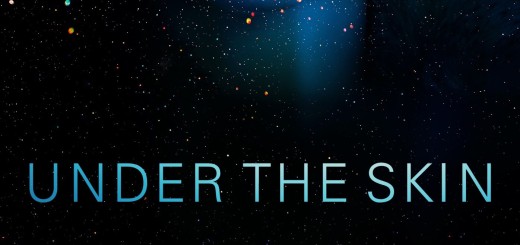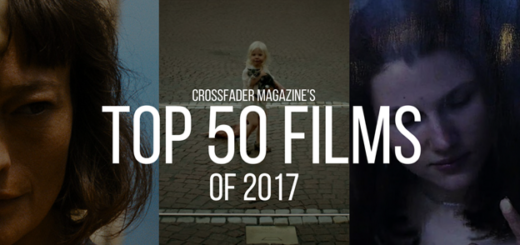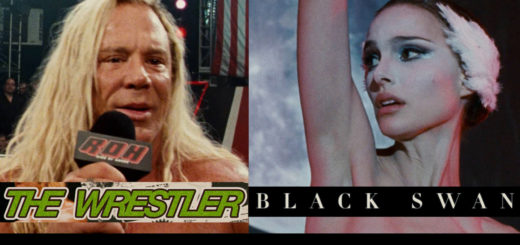Why Marvel Is Not a Cinematic Universe
Let me tell you a little story, family and friends. As I sat down for the 10:30PM showing of DOCTOR STRANGE on a Thursday night, I was delighted to find that the theatre was filled to the brim. In fact, the only empty seats that I saw in the entire house were the two right next to me — I suppose somebody caught wind of who they’d be sitting next to. If you don’t know by now, that certain someone is me, a staunchly critical Marvel naysayer. But just a peek at my yearly film rankings indicates that I at least know entertainment when I see it, so I decided to take in the latest Marvel property, a film directed by none other than Scott Derrickson of SINISTER fame.
Apart from my vague interest in Derrickson’s approach to a Marvel origin story — seriously, how do they pick their directors, the closest thing this man made to a CG epic was 2008’s THE DAY THE EARTH STOOD STILL — I also made my way to the theatre for another reason: to watch it with the people that really care. This wasn’t your average superhero audience. These were the real die hards. Working adults that were willing to sacrifice a good night’s sleep in favor of watching Cumberbatch without being interrupted by the childish squealing of SHERLOCK fans (there I go again, being mean). So I approached this to a near-anthropological degree, trying to understand what the appeal of all of this is.

“I’m taking notes on your behavior, not the films.”
The lights dimmed and the trailers started playing. First, we got a little look at GUARDIANS OF THE GALAXY VOL. 2. Boy did the vocal crowd behind me go nuts for this one. Did you know Vin Diesel would be back as Groot? Oh, and it looks like Chris Pratt and Zoe Saldana are in a little relationship tiff! Then we got a glimpse into the brooding world of LOGAN. Hugh Jackman looks more like Mel Gibson and Patrick Stewart is a minute away from cardiac arrest. It’s edgier and no-holds-barred. Both times when these trailers would end, the people in the row behind me would briskly share thoughts: “Man, this one looks like a great Wolverine film!” and “So funny!” were the most popular opinions.
Then, we got a longer trailer for the new POWER RANGERS film. As we cut to black, the entire theatre went silent. Nothing was said. Everyone sat patiently, awkwardly underwhelmed by what they had just seen. And I’m not here to say that POWER RANGERS looks good. But guys, come the fuck on, what is the difference at this point? Somebody please explain why you’re not also cheering for angsty teenagers in body armor the way you do for a Marvel property? Granted, it doesn’t have the panache or self-awareness that has helped the Marvel canon coast by on even their most subpar releases, but at a certain point it’s all the same.
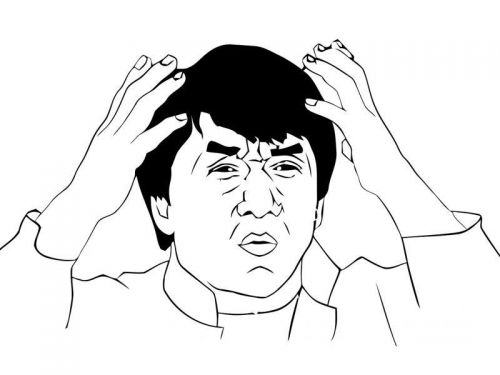
MFW I talk to any Marvel fan
Well, that’s what I thought at least. But then I started to do some thinking, and realized that Marvel is different from your average tentpole or quasi-cinematic universe. In fact, it is much more like a series. See, the title “Cinematic Universe” immediately connotes that this is something other than a TV show. But other than being inside a movie theatre upon release, what’s the difference? Down the line, our kids will only see DVDs (God that game of catch up will suck so much). These are just 90+ minute episodes. SHERLOCK is like that. Is SHERLOCK a cinematic universe? If each Marvel film were singular and only connected inasmuch that they take place in the same universe as each other, then I could buy into the title, but frankly, this is glorified TV, and if you think my voice is too annoying, you can just read the Hollywood Reporter.
And that’s what brings me to DOCTOR STRANGE. You see, there really isn’t all too much acting in these films. It’s people with recognizable faces being charming and doing cool stunts. The hype-building, fan theories, and excited rushes to the theatre don’t indicate quality anymore. This is a franchise that’s wrapped its fingers so tightly among the public consciousness that we are all too far in to quit. That’s why I think its TV. This isn’t aiming to be a singular experience anymore. It’s too monolithic. But we’ve watched all of season… ahem, I mean phase one and two, so we better keep going. It’s the same reason you didn’t stop BREAKING BAD after season four, and also why you didn’t listen to your friend when he told you not to watch the fifth season of THE WIRE.
The usher who introduced the movie ended his spiel with a polite, “remember to stick around for the end of the credits, this is a Marvel film after all!” And I shit you not, without a moment of hesitation, some jabroni had the chutzpah to mumble, “thanks for the tip.” A girl quickly called him out on his rude comment, and he swiftly retaliated with, “if you don’t know that, you were literally born yesterday.” But you know what? He’s not wrong. We all know this. In fact, you don’t have to like Marvel films to know this, and that’s the problem. We all care so much about something that’s deceptively uneventful.
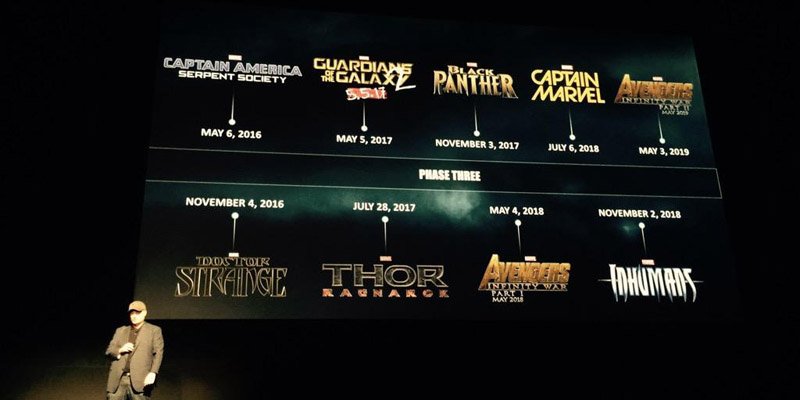
The Marvel lineup announcement, the only thing more pointless than E3
So what’s my point? That we shouldn’t be watching these films? Well, yes, but that would be too simple of a statement. Our understanding of film and canon has been changed forever because of Marvel. Going to see the latest CAPTAIN AMERICA film is no longer an experience that we anticipate with bated breath. Instead, we take it in the same way we watch our favorite television shows. But where TV has the benefit of airing weekly, Marvel makes you wait five-to-seven months between each release. To make matters worse, each film incorporates references for what’s to come, teasing you to spend your money on the next release. DOCTOR STRANGE shows us an infinity stone and CAPTAIN AMERICA: CIVIL WAR introduced us to Spiderman. But these detours are never done with grace, servicing the franchise more than the independent property, causing much of it to feel like ad space for a future installment.
And that’s what’s so odd about an IP like DOCTOR STRANGE. At the end of the day, it’s the first origin story since ANT-MAN, but its relevance to the future of the series is painted with very clear brush strokes. Doctor Strange exists because he solves the problems that The Avengers can’t. I get it, we need to raise the stakes, and since the entire fucking world has been at stake in — almost — every Marvel film since 2012’s THE AVENGERS, Marvel needs to cook up something new. Yes, now it’s not about saving the world. It’s about saving this universe, and the multi-verse, and using the mirror dimension to make sure that nobody knows it ever — my God, what have you done to me Marvel?
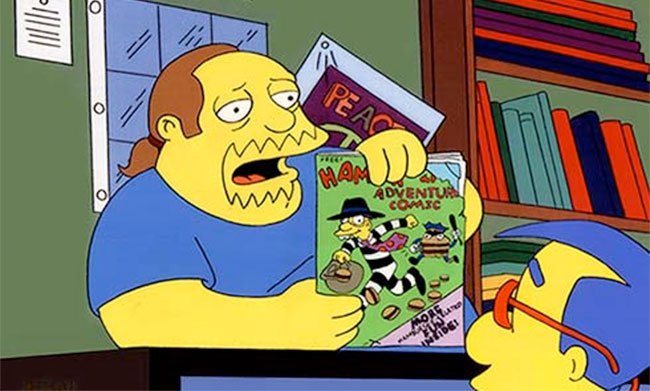
The day Homer Simpson knows as much as Comic Book Guy about fucking comics, an entire pop-culture icon is rendered meaningless
I wouldn’t go as far as to say that it feels like Marvel is putting itself on life support, but when you incorporate so many variables including time travel, you’re destined to put yourself in a position where no conflict actually means anything. If our protagonist can always turn back time, and we know that The Avengers could never have solved this crisis, then what do we even need Tony Stark and Co. for in the first place? I had a similar concern back when THOR came out, and DOCTOR STRANGE only reaffirms this theory. It’s why HEROES started to crumble by the end of its second season, and ultimately helps me discover a newfound appreciation in the smaller, more contained conflict of ANT-MAN (a credit that I can only assume is in part thanks to the writing of Edgar Wright).
Despite the fact that I really don’t care about all of this world building, I understand everything the canon wants me to know. Marvel is great at that. By incrementally spoon feeding us information about each universe, realm, and ability, they have formed a canon that is infinitely linked, and formally broken. I’m sure you’re wondering what I mean with that, but it’s really not too difficult. See, in terms of narrative, each Marvel release is a toss up. It could be as dumb and wasted as THOR: THE DARK WORLD, as character-driven as IRON MAN, or as politically relevant as CAPTAIN AMERICA: THE WINTER SOLDIER. But one thing never changes: While the dialogue quickly, but effortlessly delivers the exposition to propel the canon, the spectacle is there to dazzle you into having a good time.
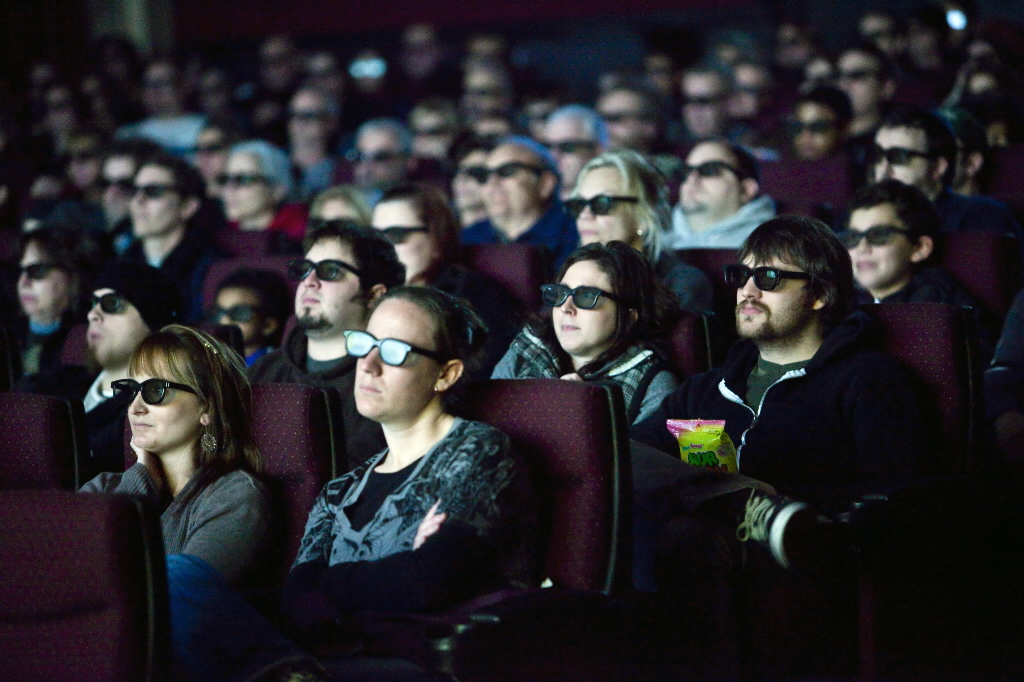
It’s not a 3D movie, that’s just LA
The fact that the aesthetics of each Marvel film have become virtually interchangeable is so odd. At the end of the day every hero and their power is distinct, yet each film basically reads the same. I mean, sure, maybe DOCTOR STRANGE and its contemporaries are fun, but that’s such a loose term. The best way to explain it is this: You know that friend you have who says that MAD MAX: FURY ROAD isn’t a good movie? If they ever, and I mean ever, enjoyed a single Marvel property, you have every right to slap them across the fucking head. The reason I say this is because at least George Miller wasn’t afraid of his visual extravaganza. MAD MAX: FURY ROAD cherishes its aesthetic and thrives in its own excess. It’s a film that aims for excitement for 120 minutes and delivers. Meanwhile, Marvel goes through the motions of making you think that there’s more to it. But news flash, there isn’t.
“Hey Mr. Knows-No-Fun, these are smart, dramatic films too,” says you. And you’re not always wrong. CAPTAIN AMERICA: THE WINTER SOLDIER is an admittedly powerful social commentary. These films are consistently engaging, I won’t deny it. But what frustrates me to no end is how haphazard they really are in execution. DOCTOR STRANGE is a fantastic case in point. There’s a lot of dramatic highs and lows within its first 30 minutes. Cumberbatch performs a lot of this with the ease of a theatre actor. But it also highlights something unique about these films, namely their reliance on skilled performers to deliver every piece of exposition. Nothing is ever shown to us with time and patience. Instead we are told that Cumberbatch is upset. His physiotherapist informs us that somebody was magically able to walk after a severe spinal injury. What’s shown to us? Apart from the action, next to nothing.
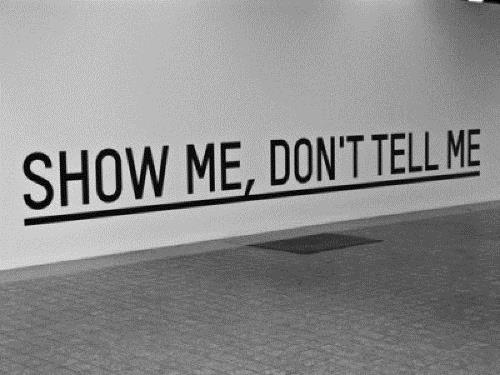
Even TUMBLR knows!!!
All of these sequences should be delivered with the same finesse that Marvel uses to frame their epic battle scenes. And that’s the oddly incongruous nature of the contemporary superhero genre. When we are watching DOCTOR STRANGE or THE AVENGERS: AGE OF ULTRON, we have two presets: I am watching an action scene, or I am watching a dialogue scene. In terms of aesthetics, the action is almost always top of the game with Marvel (just look at how much worse DC does it most of the time). Pick almost any superhero film since IRON MAN, and you’ll be forced to admit that it’s at least cool. But when we look at the visual qualities of a dialogue scene, everything is shockingly flat. The camera is unguided, either locked to standard talking head coverage or aimlessly floating across the room in search of the next edit. So why are you entertained the whole way through? Well, Robert Downey Jr. is a pretty funny guy. So is Paul Rudd, and — shocker — so is Benedict Cumberbatch.
For a franchise that prides itself on its opulence, Marvel films are shamefully divided in their visual storytelling. As works of sheer spectacle, they are dazzling and mystifying accomplishments, the type of films that really cement your respect for working directors and VFX artists. But as actual pieces of art, films that engage you through the very drama that we’ve been studying since Aristotle’s bestseller,POETICS, hit the shelves, they’re virtually bankrupt. And that’s why I bring up a contemporary like MAD MAX: FURY ROAD, because it is visually consistent for its entire running time, integrating its drama and character interplay so seamlessly into its momentous narrative that this visual inconsistency never even has a chance to occur. Hell, don’t take my word for it, check out Tony Zhou’s EVERY FRAME A PAINTING on the editing in ANT-MAN, or his discussion on the laziness of Marvel’s original soundtracks:
and
At this point you just want me to shut up, I know. You’ve probably already started your comment with “Por que no both? Can’t I like all blockbusters?” Yes, of course you can, but here’s the thing, you don’t have to. I’m not here to hurt your feelings or call you names for watching Marvel films. I just want to remind you that there’s another way. You can watch MAD MAX: FURY ROAD and get your fill of action, but Marvel is playing you for keeps. They want you shelling out for those Dolby Atmos IMAX 3D tickets every half a year. And I understand why we all do it. As a filmmaker, it must be a dream come true to direct a Marvel film (God knows I’d do it) and as a viewer you are treated to at least two new spectacles on an annual basis. But our continued support of Marvel is what allows for this formal laziness.
As I exited the theatre, the fedora-clad man in front of me was telling the two women he was with just how awesome DOCTOR STRANGE was. I wanted to ask him, “was it, really though? What did we gain from this film?” Well, we’re told about how these dimensions work and we get to see Cumberbatch ascend in the ranks to become Master Strange. It’s all pretty cool. But what we never seem to address is that DOCTOR STRANGE’s cataclysmic finale is entirely reverted, meaning that nobody but Cumberbatch and a handful of supporting actors will even know it ever — almost — happened. So technically, this was a filler episode. So yeah, if you’re that guy who hated BREAKING BAD’s “The Fly,” but you also liked DOCTOR STRANGE, then do yourself a favor and start re-thinking the way you approach canon.
I do think it’s somewhat unfair to make the comparison to television, though. After all, plenty of serialized shows incorporate a plethora of visual qualities and master visual storytelling. Marvel’s problems go far beyond their aesthetic identity. What’s odd is that even BATMAN VS SUPERMAN: DAWN OF JUSTICE was able to distinctly be Zach Snyder’s film. And while critical reception crippled it, you can’t deny its singular vision when compared to the flatness of its peer, CAPTAIN AMERICA: CIVIL WAR. These are films that don’t feel like they’re being directed by artists anymore. Their consistency in everything from tone to quality (that’s the real shocker, every Marvel film is usually at least average) feels like the product of an assembly line, sporting the exact antithesis of authorship, resulting in voiceless properties that are always entertaining in the exact same way.
Oh right, the review for DOCTOR STRANGE? Next time, I guess.

